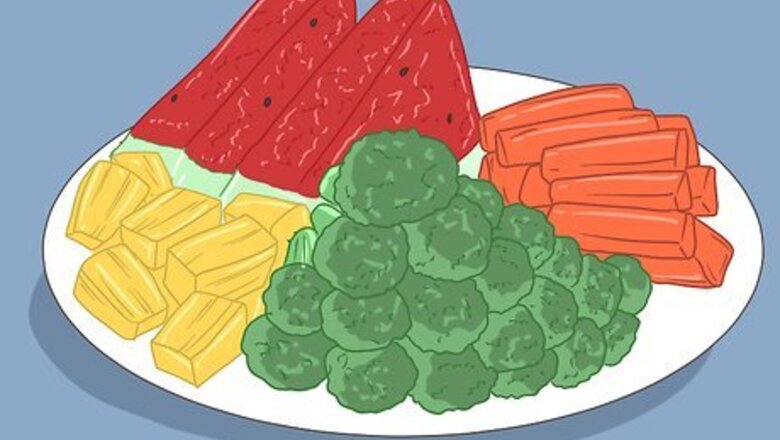
views
X
Trustworthy Source
Mayo Clinic
Educational website from one of the world's leading hospitals
Go to source
Your doctor might prescribe medications to lower your triglycerides, but most doctors will recommend some dietary and lifestyle changes first. In many cases, you can lower your triglyceride levels with these natural treatments. Continue monitoring your levels and follow your doctor’s advice if you need further treatment.
Dietary Changes
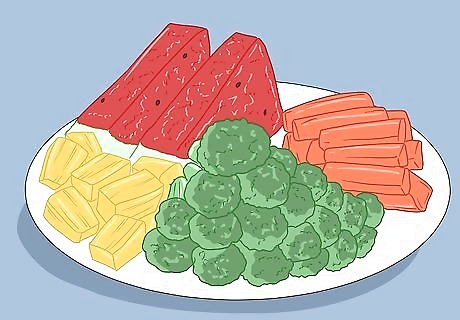
Include fruits and vegetables in every meal. Fruits and vegetables contain plenty of vitamins, minerals, and other nutrients that keep you healthy. These fill you up without increasing your triglyceride levels. Try to build your diet around at least 2-4 servings of fruits or vegetables in each meal. You can also snack on some more throughout the day. In some cases, your doctor may tell you to reduce your fruit intake because fruit is high in sugar. However, don’t do this without your doctor telling you to.
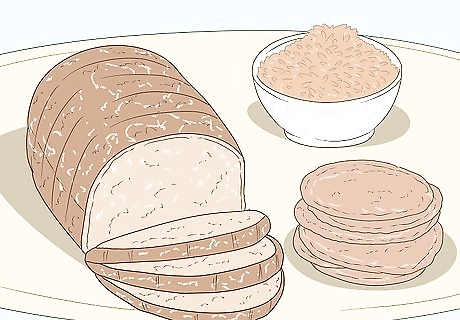
Switch to whole-wheat products for a good source of complex carbs. Simple carbohydrates are converted into sugar and can raise your triglyceride levels. If you eat any products with enriched flour, switch to whole-wheat or grain types for complex carbs instead. In general, white products like bread and rice are enriched. Instead, switch to brown types. Added sugars are also simple carbs, so reduce the amount of sweet foods that you eat.
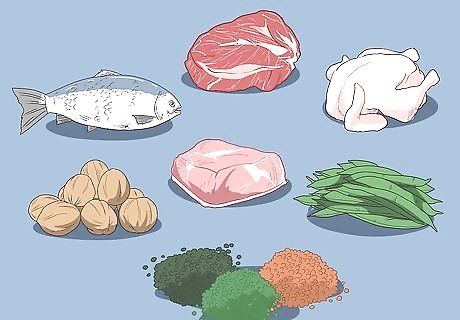
Get your protein from lean meats or plants to avoid saturated fats. These sources are lower in saturated fat than others, like red meat. Fatty foods raise your triglyceride levels. Get your protein from poultry, fish, beans, lentils, soy, nuts, and legumes instead. If you eat poultry, remove the skin before eating it. The skin is high in saturated fat. You can still have a little red meat, but don’t have any more than 3 servings per week.
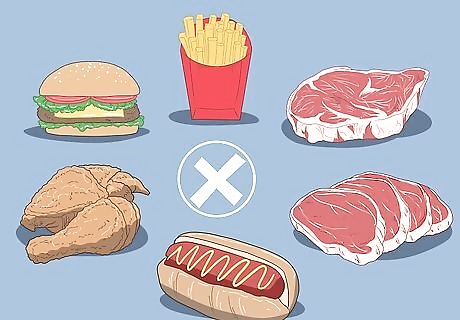
Replace fatty foods with ones high in omega-3s or “good” fats. Saturated fats can increase your weight, blood pressure, and triglyceride levels. Try to cut out sources of saturated fat like butter, margarine, red meat, and processed or fried foods. Instead, replace them with sources of healthy fats. Good sources of omega-3 fatty acids and other healthy fats are fish and shellfish, nuts, seeds, beans plant oils, avocados, and dairy products. Even if all your fats come from healthy sources, fats shouldn’t make up more than 30% of your daily calories. In a 2,000-calorie diet, this is 600 calories.
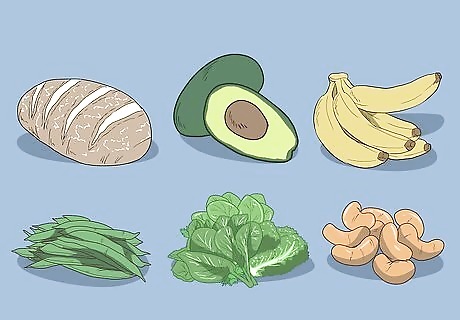
Consume 25-30 g of fiber each day. Fiber also helps lower your triglyceride levels. You should try to get at least 25-30 g per day to keep your digestion moving smoothly. Good sources of fiber include whole grains, leafy green vegetables, beans, nuts, and fruits. You can also get more fiber from supplements, but doctors recommend that you get as much as possible from your regular diet first.
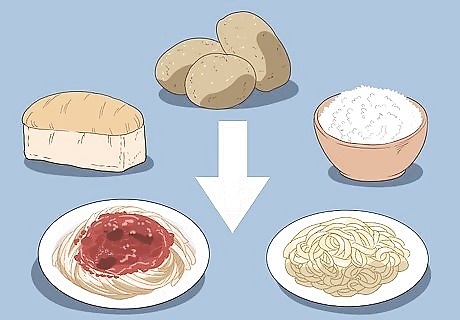
Limit your starch intake to 2-4 servings per meal. While some starch is okay, excess starch could be converted into triglycerides. Cut yourself off at 2-4 starch servings per meal to avoid raising your triglyceride levels. Starchy foods include bread, potatoes, pasta, rice, and noodles.
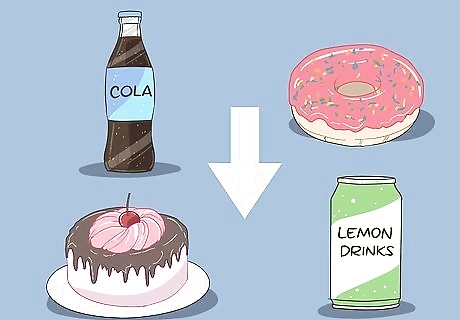
Cut out as many added sugars as you can. Sugary foods can also raise your triglycerides. Try to limit the amount of dessert, soda, and other sugary drinks in your diet. If you want something sweet, look for sugar-free or diet varieties instead. Get into the habit of checking nutrition labels for added sugars on everything you buy. You might be surprised how much sugar some foods contain. Added sugars are different from natural sugars, like the ones in fruits. In general, you don’t have to lower your intake of natural sugars, but in some cases your doctor might recommend reducing your fruit intake.
Lifestyle Remedies

Exercise for 30 minutes a day. Exercise helps lower your triglycerides and could boost your levels of HDL “good” cholesterol. Try to get 30 minutes of exercise at least 5 days per week for the best results. Aerobic exercises like running, walking, biking, or swimming are best for lowering your triglyceride levels. You can also try to get more exercise while doing your daily tasks. For example, you could take the stairs instead of the elevator.
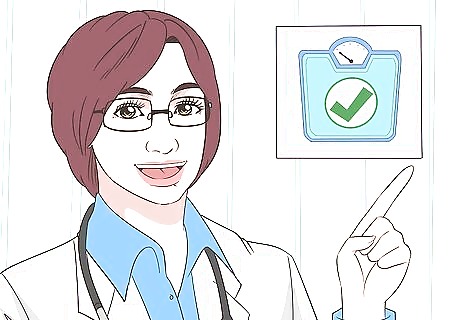
Maintain a healthy bodyweight. There’s evidence that even a small weight reduction can lead to a big decrease your triglyceride levels. If you’re overweight, you should talk to your doctor and find out the ideal weight for yourself. Then design a diet and exercise routine to reach and maintain that weight. The good news is that following a healthy diet and exercising to lower your triglycerides will also help you lose weight. Avoid crash or extreme dieting. These could be dangerous and participants often regain the weight once they go back to their normal diet.

Drink alcohol in moderation. Excessive alcohol consumption could make you gain weight and could raise your triglycerides. Keep your drinking within an average of 1-2 drinks per day so you don’t overdo it. If your levels are high or you need to lose a lot of weight, you may want to cut alcohol out altogether. Talk to your doctor for guidance.

Quit smoking, or don’t start in the first place. Smoking is dangerous for your overall health. It could raise your blood pressure and make you gain weight, all of which could raise your triglycerides. It’s best to quit smoking as soon as possible, or avoid starting altogether.
Herbs and Supplements
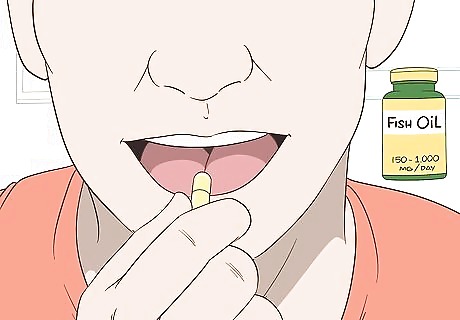
Get an omega-3 boost with fish oil supplements. Studies show that high omega-3 doses could reduce triglyceride levels. Fish oil supplements are the most common way to get an omega-3 boost, so try taking these supplements and see if they help. Common fish oil doses range from 150-1,000 mg, so follow the dosing instructions on the brand you use. Fish oil could interact with blood thinners, so ask your doctor before trying these supplements if you’re on this medication. If you’re a vegetarian, you can also get omega-3s from different supplements like algae or flaxseed oils.
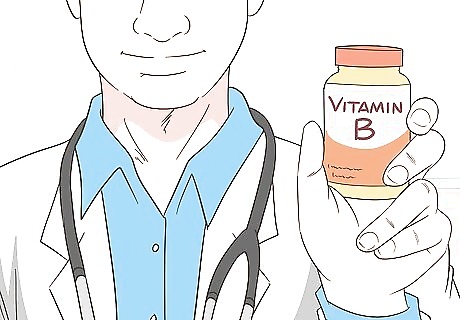
Take vitamin B supplements. Vitamin B, particularly B6, 9, and 12, show some success in keeping triglyceride levels down. Try taking a vitamin B supplement to boost your levels and see if this controls your triglycerides. In general, you need 1.2-1.4 mg of vitamin B6, 200 mcg of B9, and 1.5 mcg of B12 each day. You may be able to get enough vitamin B from a regular multivitamin supplement, or your doctor may suggest a specialized vitamin B or folic acid supplement.
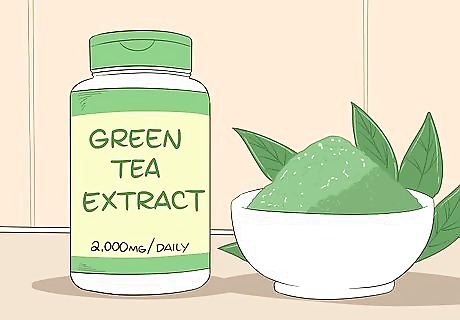
Try green tea extract supplements. Evidence is unclear, but green tea extract might lower triglycerides and LDL cholesterol. There's no universal dose for green tea supplements, and daily doses range from 150-2,500 mg. It's best to follow the dosing instructions on the product you use. Green tea supplements might interact with blood thinners like warfarin, so don’t take them if you’re on this medication.












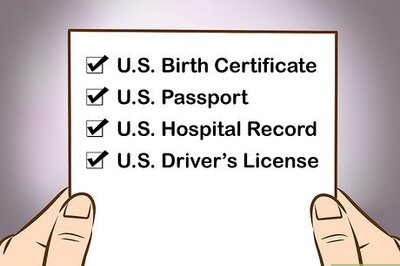



Comments
0 comment